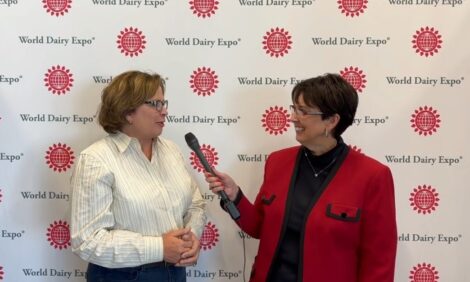



How Will the End of Milk Quotas Affect My Farm?
EUROPE – As the curtain closes on over 30 years of milk quotas, farmers are considering the effects of a liberalised milk market place across Europe.Some fear the worst, with the European Milk Board warning of producers drowning in “waves of surplus milk”. Meanwhile, many think global demand is sufficient, providing a “safety net” is there during volatile times.
In light of this, farmer groups have repeatedly called for a legislative response from the Commission to steer the industry through times of market imbalance.
In turn, farmers have been told to consider forward selling and that a futures market holds the key for risk management.
European farmer and agri-cooperative Copa-Cogeca, however, is of the view that the EU Commission should be doing more to guide the sector ahead.
The Commission has talked of measures to manage a “soft landing” with quota abolition but Copa has reiterated demands that the legislation offers the “right tools”.
Copa believes current market measures at the EU’s disposal no longer represent “a real safety net” and says further regulations, along with industry responses like margin and profit insurance, could help protect farmer income.
More cooperation is also needed to strengthen producer bargaining power.
Copa secretary general, Peka Pesonen, said: “Dairy cooperatives help to strengthen producers positioning on the market. In a post-quota era, it is more important than ever for producers to join cooperatives to improve their position on the market, enabling them to get a better price for their milk.”
Dairy specialist at Copa, Mansel Raymond, said the severe short-term economic and cash flow problems should be addressed by returning money from the milk super-levy bill back to the sector.
On the Farm
The European Commission has tried to answer burning questions farmers may have about the quotas ending.
Day to Day
Quota termination means an “administrative simplification” in terms of monitoring daily production. This said, the Commission stressed a greater requirement to responsibly monitor market signals “more closely”, with help from producer organisations and the Commission’s Milk Market Observatory.
Is there Still Support?
Private aid and storage schemes still exist, as used for the Baltic States and Finland in response to the Russian ban.
Will We Have Butter Mountains Again?
No – the commission sees guaranteed prices for butter and SMP as a safety net to put a floor in the market.
The Commission explained: “This means that producers are looking at the market when they decide how much to produce. Increased focus on added-value products (such as cheese and yoghurts) as well as on ingredients for nutritional, sports and dietary products have a strong potential in terms of growth and jobs for the EU.”
Will Dairy Be Cheaper in the Shops?
Farmer price and shop label price don’t always correlate, said the Commission. In the first half of 2014, farmgate prices lifted 13 per cent across the EU, although was reflected by an 8.4 per cent rise in German shops and a 0.8 per cent rise in France.
Will This Mean More Volatility for Milk?
Rather than focus on the volatility, (which is a “normal characteristic of agricultural markets”) the Commission instead viewed said quotas “impede farmers to follow market signals and follow market opportunities”.
It reaffirmed that public intervention is available if prices drop below the reference level.
“Production should be based on market needs and opportunities,” said the Commission.
More Market Support and Producer Protection
Farmer Unions across Europe have called for more producer protection and support to protect from volatility, something which analysts have repeated is a fact of agricultural markets.
Speaking at the Dairy Policy for the 21st Century Conference in Brussels earlier this month, MEP, Jim Nicholson, said “further improvement” is needed on the Milk Marketing Observatory.
Meanwhile, German Professor, Holger Thiele, Kiel University, stressed the need for a “moderate increase” of a safety net.
He told the conference that market-based insurance and risk management was key.
A rather negative view is taken by Finnish farmer organisation MTK, which sees quota termination as badly timed and a "threat". The German Farmers Association (DBV), on the other hand, has concentrated on the need for farmers to “break new ground” in market hedging and risk management, increasing the entrepreneurial role of the farmer.
The DBV assessment was: “The end of the milk quota system brings more entrepreneurial discretion over to producing milk more responsibly for the development of their own company as well as greater fluctuations of the milk producer price with them.”
Responsibility
Like the DBV, the English National Farmers Union has stressed the role of responsible production, warning that milk production is already rising with no plans as to where it will go.
This means expansion in EU countries should be “planned in accordance with available market opportunities".
UK production, unlike many other Member States, has been under-quota for fifteen years, instead being reined in, not by agricultural policy, but by low prices.
This is according to NFU dairy board chairman, Rob Harrison, who said tough challenges lie ahead but the long-term outlook for dairy farmers is good.
This up-beat view is shared by many who point to new avenues in Asia, North Africa and the Middle East and the value-added products that can be sold abroad.
In a series of graphs, the European Union tips exports of whey powder, cheese and skimmed milk powder exports to grow the most in a projection to 2024.
Challenge and Opportunity
Such growth in added-value items means, according to the Commission, more jobs in processing sectors, as outlined by Agriculture Commissioner Phil Hogan this week.
He sees quota abolition as both “a challenge and an opportunity” and was quoted by dairy leaders in Brussels earlier this month as saying: “It is hard to find a sector with more promising prospects in the future than dairy.”
"The end of the milk quota regime is both a challenge and an opportunity for the Union," said Commissioner Hogan this week.
"It is a challenge because an entire generation of dairy farmers will have to live under completely new circumstances and volatility will surely accompany them along the road.
He viewed it as a chance to build growth and jobs for the EU economy by increasing focus on value added 'functional food'.
"The dairy sector has the potential of being an economic driver for the EU," he added.
Michael Priestley
News Team - Editor
Mainly production and market stories on ruminants sector. Works closely with sustainability consultants at FAI Farms



